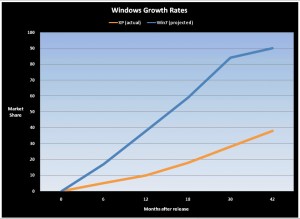Will Windows 7 be Microsoft's biggest business hit ever?

Last week, the Internet echo chamber went crazy over the release of a survey conducted by Dimensional Research on behalf of its client KACE. The survey asked more than 1100 IT professionals about their plans to deploy Windows 7, and the headlines, based on a few preliminary reports, were a predictable mish-mash of Microsoft bashing. The most common themes in the hundred or more stories I scanned (most of them second- or third-hand reports, based on the same preliminary press releases) suggested that businesses are wary of Windows 7 and that IT admins prefer XP.
A new survey says 46% of businesses expect to begin their Windows 7 upgrades before the end of 2009
The most negative headline of all was delivered by VentureBeat, which has backed up the hearse for Windows 7 and is ready to cart it away: Study: Windows 7 could follow Vista to an early grave.
They’re wrong. If the data provided by Dimensional Research is accurate, Windows 7 is on track to be Microsoft’s most successful business OS release ever. And a second newly released survey from a technology-focused investment bank suggests that those numbers are indeed a realistic reflection of how businesses plan to approach Windows 7.
I downloaded the full Dimensional Research report (sponsored by KACE and available in PDF format) and read it closely. I compared actual adoption rates of Windows XP against the projected adoption rates predicted by the Dimensional Research study. My reading of the data suggests that the echo chamber got the story backwards.
Here, see for yourself:
The orange line indicates actual adoption rates for Windows XP in businesses, which were at about 10% after one year and had reached 38% by early 2005, more than three years after XP's release. The blue line is the Windows 7 adoption rate forecast by the Dimensional Research study.
According to Dimensional Research, more than 80% of IT pros plan to move to Windows 7 within 36 months of the survey date (which was in turn about six months earlier than the expected release date of Windows 7 in September of this year). That would be, by historical standards, phenomenal. Breathtaking, in fact.
Now, I have some issues with the Dimensional Research study, which is lacking some key details. For starters, they don’t offer any information about the size of the businesses that the survey respondents represent. And they didn’t ask about the specifics of their migration plans. So it’s hard to draw firm conclusions.
But the overall trend is confirmed by the results of another recent study, this one conducted by Pacific Crest Securities, an investment bank that focuses on technology. They asked 80 IT decision makers at enterprises with more than 1000 employees about their Windows upgrade plans. The results were startling:
- 50% plan to upgrade to Windows 7 as soon as it is available
- 46% expect to start the upgrade before the end of 2009, within months of Windows 7’s release
- 55% of respondents expect to do system-wide upgrades, rather than upgrading as new PCs are purchased.
That’s astonishing.
Digging a little deeper into the survey results, I noted that 34% of respondents said they like what they have seen in Windows 7 but are delaying deployment for economic reasons; another 12% are delaying deployment "for product reasons," presumably meaning they want to see the final release and maybe even wait for Windows 7 Service Pack 1. Of the total responses to the survey, 96% said they "like Windows 7," and only 4% said they don't like it. An earlier survey of the same group in January had a "don't like" rating of 12%. Presumably, the increase in approval is based on familiarity with the beta release.
The Internet echo chamber, which is conditioned to run at the speed of Twitter, assumes that any tech product is a failure if it doesn’t achieve world domination in 30 days or less. Businesses, especially large enterprises, move at much more deliberate speeds. I’ve written about Windows adoption rates before (and in fact drew the data for XP adoption rates from that earlier post). Businesses need a year or so after a new Windows version is released to test their in-house software for compatibility and to plan a thoughtful migration strategy. When nearly half of IT pros in large businesses say they are willing to begin migrating to Windows 7 within months of its release, that is a profound indicator of its potential for success.
